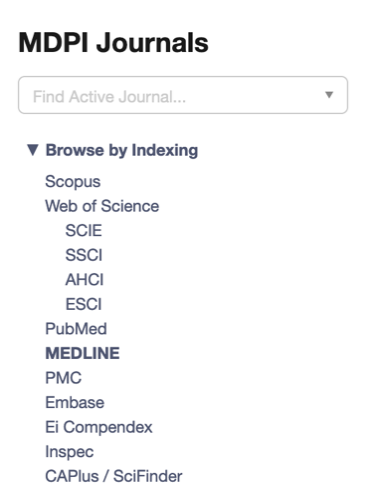
Journal Menu
► ▼ Journal Menu-
- Mathematics Home
- Aims & Scope
- Editorial Board
- Reviewer Board
- Topical Advisory Panel
- Instructions for Authors
- Special Issues
- Topics
- Sections & Collections
- Article Processing Charge
- Indexing & Archiving
- Editor’s Choice Articles
- Most Cited & Viewed
- Journal Statistics
- Journal History
- Journal Awards
- Society Collaborations
- Conferences
- Editorial Office
Journal Browser
► ▼ Journal BrowserNeed Help?
Announcements
3 September 2024
MDPI INSIGHTS: The CEO's Letter #15 - CHORUS, Best Paper Award, August Events

Welcome to the MDPI Insights: The CEO's Letter.
In these monthly letters, I will showcase two key aspects of our work at MDPI: our commitment to empowering researchers and our determination to facilitating open scientific exchange.
Opening Thoughts

I am pleased to share that MDPI is now an Affiliate Member of CHORUS, a not-for-profit organization dedicated to ensuring public access to articles reporting on U.S. government-funded research. This partnership highlights our long-standing commitment to advancing Open Access (OA) publishing and meeting funders’ open research requirements.
Read the full announcement here.
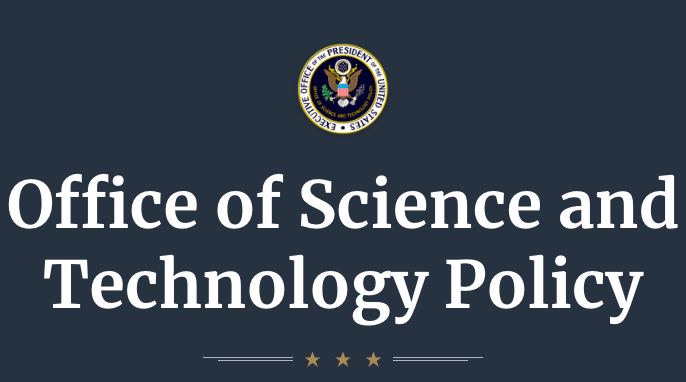
With the White House Office of Science and Technology Policy (OSTP) 2022 memorandum calling for immediate public access to all federally funded research by 2026, this partnership positions MDPI to further support academic institutions in adhering to national mandates while providing authors with fully compliant (CC-BY) OA journals.
The CHORUS platform went live in July 2014 and includes NASA, the U.S. Department of Energy, the U.S. Department of Defense, the U.S. Geological Survey, and the National Science Foundation.
“This partnership positions MDPI to further support academic institutions in adhering to national mandates”
Joining CHORUS perfectly aligns our mission as the leading OA publisher, which is to drive transparency and innovation in scholarly publishing, with that of CHORUS itself, which is to advance Open Access research. It will also support MDPI publications from organizations such as NASA, with 1,200 research papers published by NASA-affiliated authors as at 31 August 2024.
Impactful Research
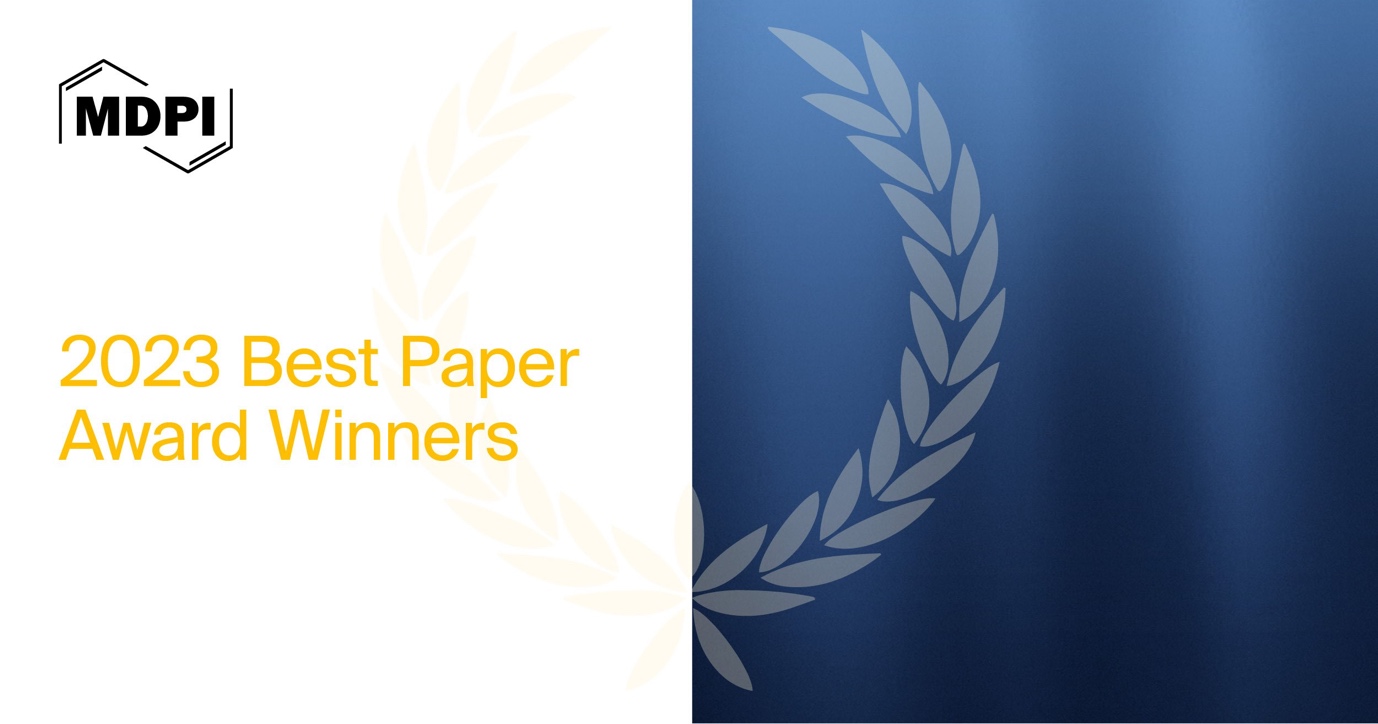
MDPI’s Best Paper Awards—Award-Winning Papers in 2023 Announced
MDPI is committed to supporting and recognizing the academic community and is proud to announce the recipients of the 2023 Best Paper Awards, which recognize high-quality papers of significant scientific merit and impact. Each year, the editors of our journals carefully select papers that showcase outstanding scientific achievement.
This year, 115 Best Paper Awards were presented, chosen from 346 exceptional papers in a highly competitive selection process. Congratulations to the authors for their remarkable contributions!
To learn more about all the awardees and their research projects, visit the following pages:
- Biology and Life Sciences
- Business and Economics
- Chemistry and Materials Sciences
- Computer Sciences and Mathematics
- Engineering
- Environmental and Earth Sciences
- Medicine and Pharmacology
- Public Health and Healthcare
- Social Sciences, Arts and Humanities
- Physical Sciences
About MDPI Awards
MDPI regularly offers various awards to recognize researchers, particularly young scientists, and to promote communication within the scientific community. These awards exist to inspire and acknowledge talented scientists who have made significant contributions to advancing their fields.
To find out more MDPI awards, please click here.
“Our awards exist to inspire and acknowledge talented scientists”
Inside MDPI
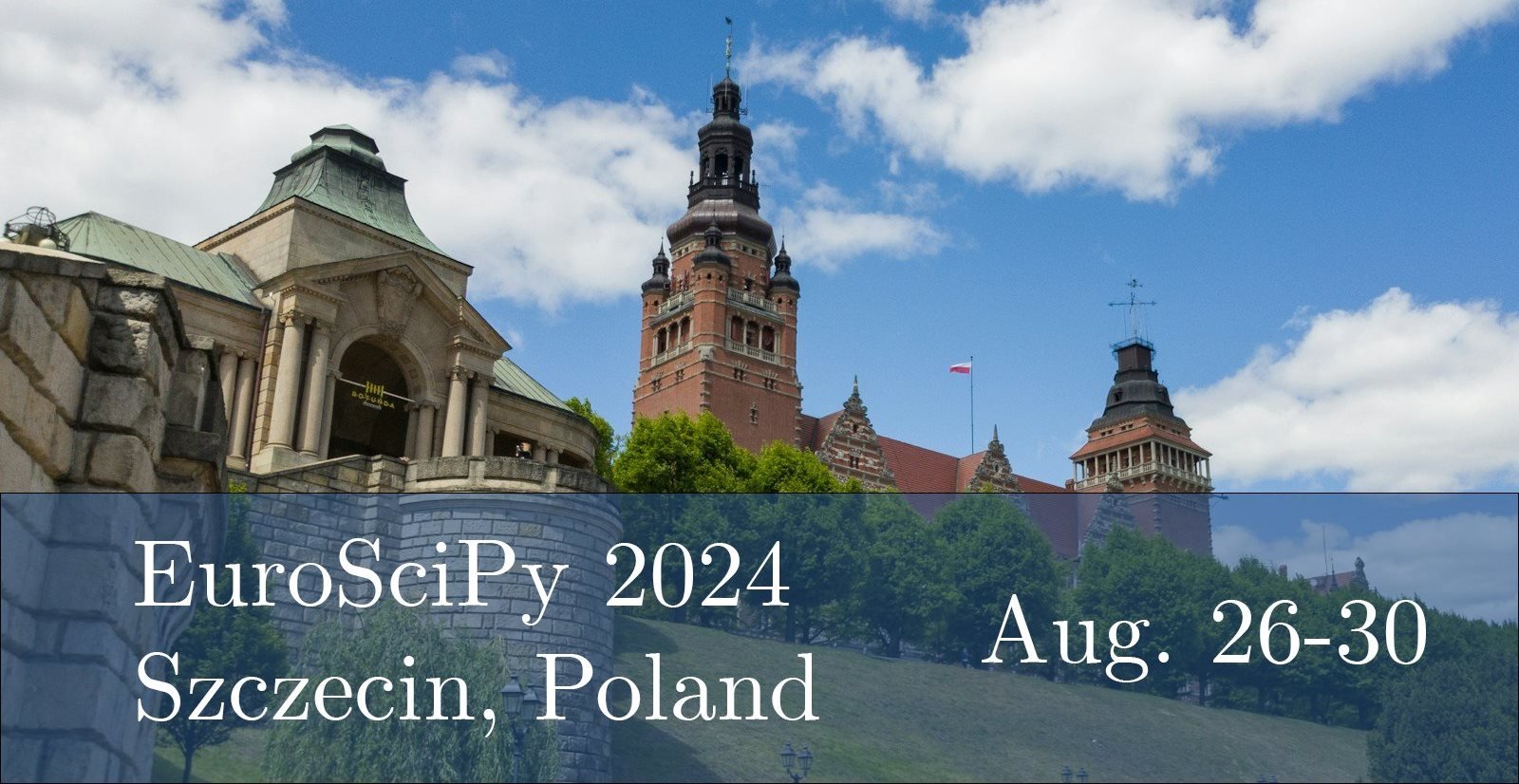
MDPI AI Team Presented at EuroSciPy 2024 in Poland
As part of the CEO Letter, I hold dear this ‘Inside MDPI’ section, where I have an opportunity to highlight various projects, teams and updates within our organization. As such, I’m happy to showcase the following presentations from members of MDPI’s Artificial Intelligence (AI) team, which were recently presented at the EuroSciPy 2024 (16th European Conference on Python in Science). This conference took place in Szczecin, Poland from 26–30 August.
“This event was a great opportunity to reinforce our commitment to innovation and excellence in publishing”
MDPI colleagues Frank Sauerburger (AI Tech Leader) and Daniele Raimondi (Senior Data Scientist) both presented at the conference. Frank discussed MDPI’s AI infrastructure, while Daniele showcased a new methodological approach we have been developing to track the journey of rejected academic manuscripts. This approach combines AI, data science and analytics to improve the identification of manuscripts and authors, enhancing our understanding of publishing dynamics.
This event was a great opportunity to reinforce our commitment to innovation and excellence in publishing. It also allowed us to contribute to the academic discussion on integrating AI and data science into scholarly communication.
From data analysis in Jupyter Notebooks to production applications: AI infrastructure at reasonable scale – Frank Sauerburger
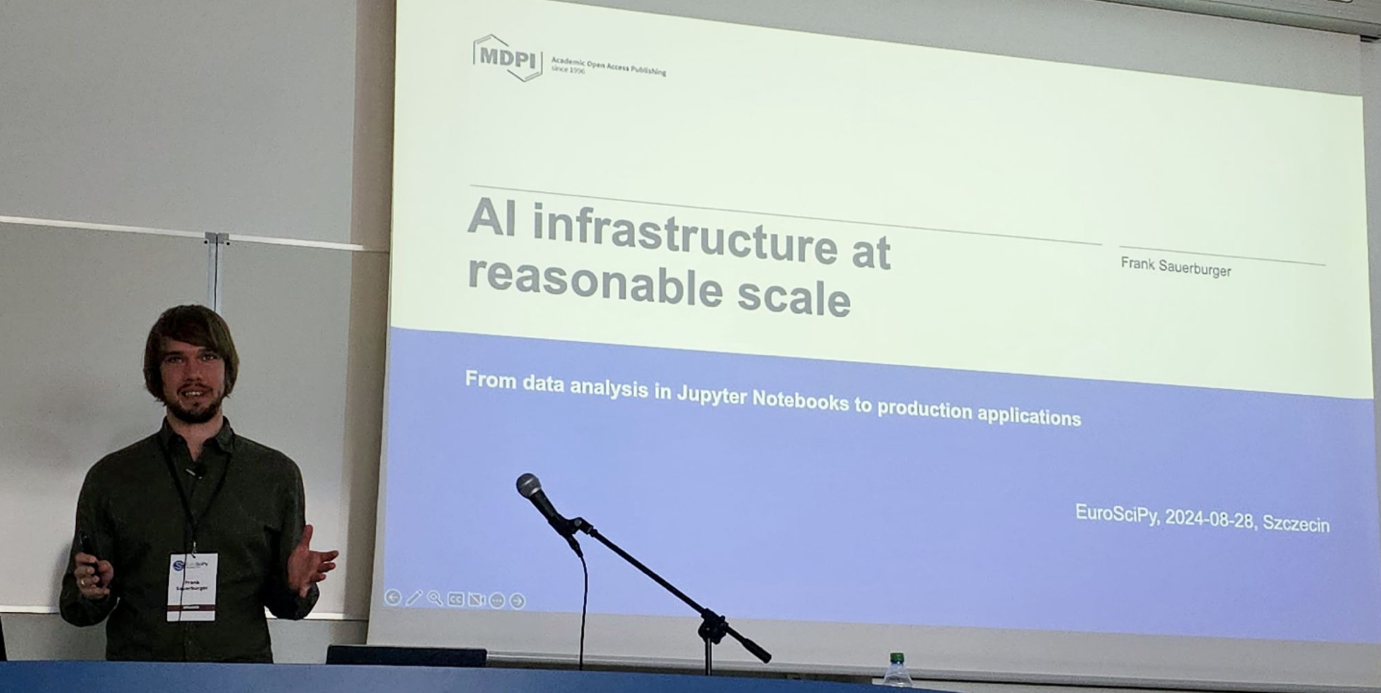
Frank’s presentation on MDPI’s AI infrastructure provided a chance to showcase the advanced technological frameworks that power our operations. Given the technical and academic focus of EuroSciPy, this talk demonstrated how MDPI’s AI capabilities are not only cutting-edge but also central to driving efficiency and innovation in scholarly publishing. Engaging with the EuroSciPy community helps position MDPI as a leader in applying AI within the publishing industry, fostering potential collaborations and attracting interest from top researchers.
A Qdrant and Specter2 framework for tracking resubmissions of rejected manuscripts in academia – Daniele Raimondi
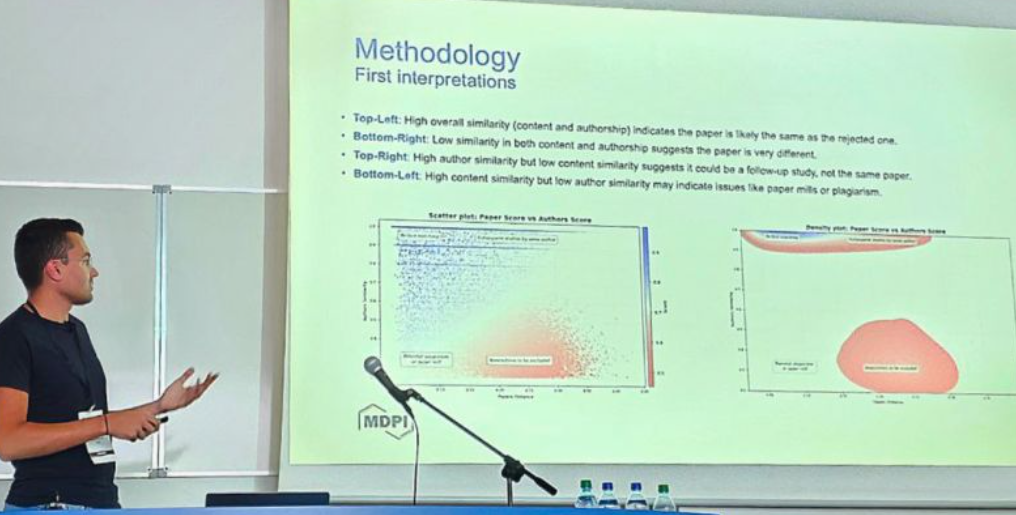
Daniele’s talk on the novel methodological approach that combines AI, Data Science, and Analytics was crucial in highlighting how MDPI is advancing the precision and effectiveness of manuscript and author identification. This approach is pivotal in enhancing our understanding of publishing dynamics and ensuring the quality and integrity of the academic content we manage. By presenting at EuroSciPy, we had the opportunity to engage with an audience deeply involved in scientific computing, gaining feedback and insights that could further refine our methodologies.
Thank you, Frank and Daniele, for representing MDPI so well!
I will share more about MDPI’s AI team and projects in upcoming CEO Letters, as we have a well-rounded AI and Data Team working on an exciting suite of AI products for MDPI and the scholarly community at large.
Coming Together for Science
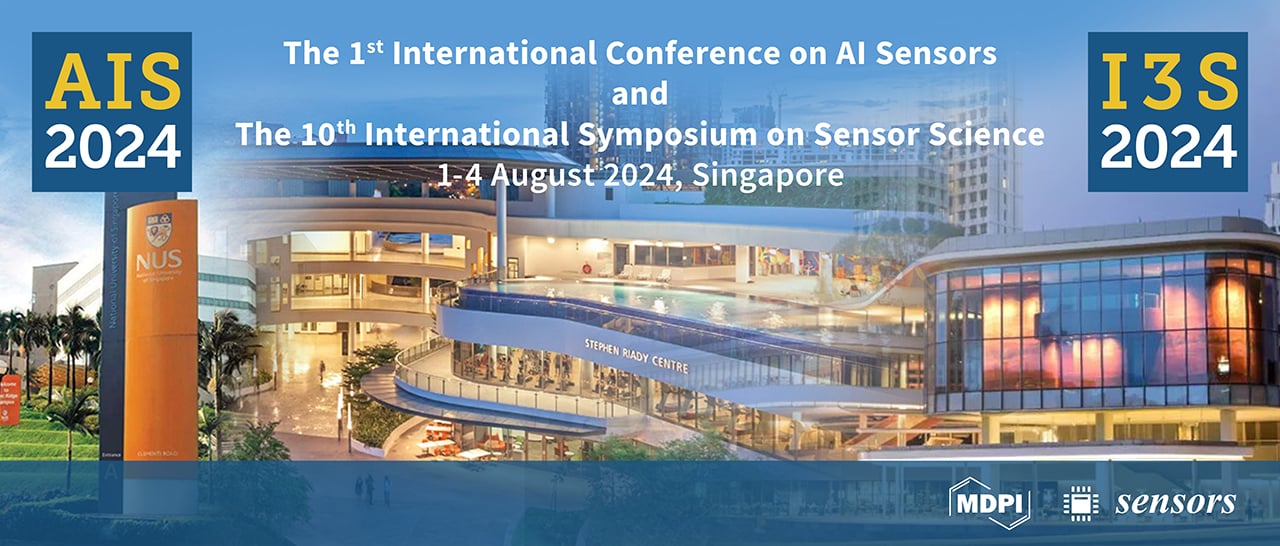
The 1st International Conference on AI Sensors & The 10th International Symposium on Sensor Science
I am pleased to share the success of our MDPI conference The 1st International Conference on Artificial Intelligence (AI) Sensors and the 10th International Symposium on Sensor Science in Singapore this past 1–4 August.
With nearly 400 attendees, the event brought together researchers and industry experts from China, Singapore, Japan, Korea, Taiwan, India and other countries to share their findings on the latest developments in sensors, sensing technology, artificial intelligence for sensing applications and AI-enhanced sensing systems.
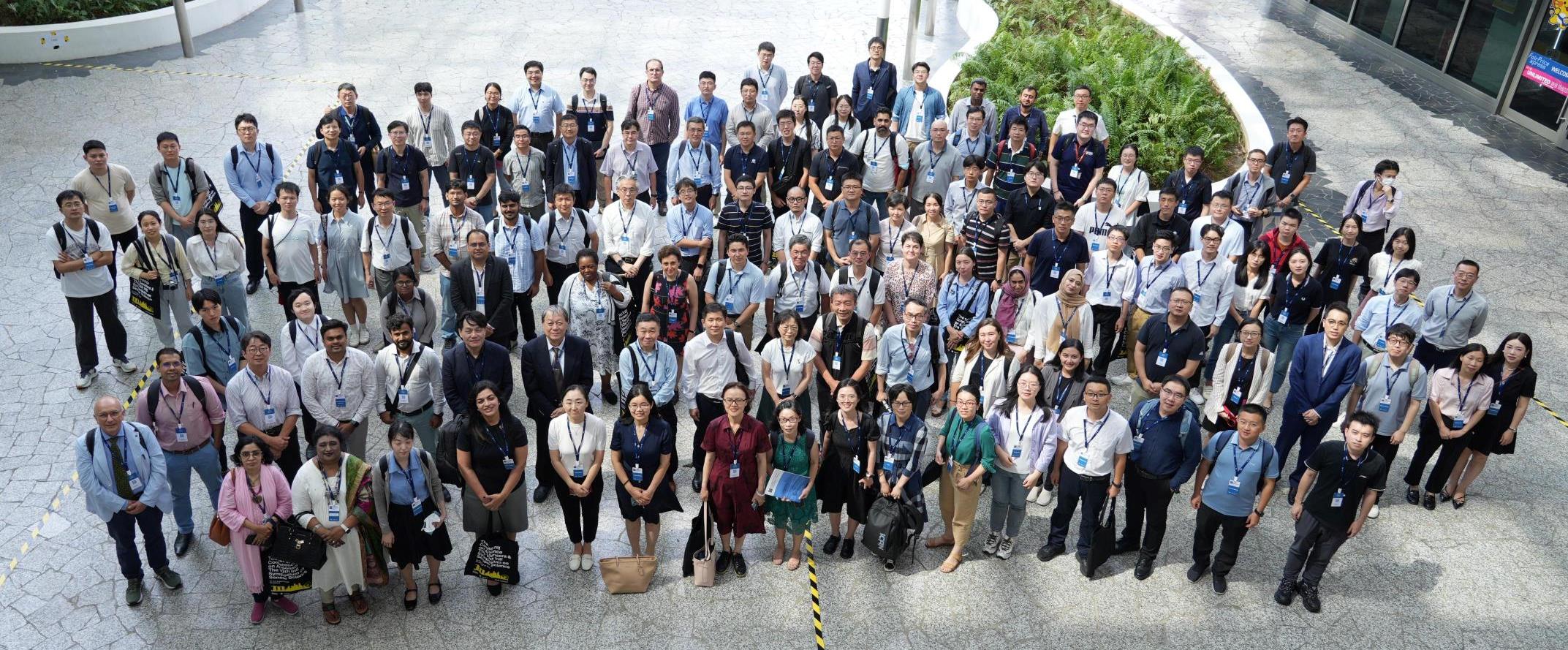
We accepted a total of 355 abstracts, featuring 772 authors from 28 countries. Over the course of the four-day event, 66 posters were displayed and 296 talks were delivered, including 4 plenary talks, 46 keynote speeches, 122 invited talks, and 124 selected oral presentations. View the event gallery here.
I am pleased to announce the winners of the four awards, including Best Presentation and Best Poster, recognizing the contributions of our participants during the conference.
Looking ahead, the 2nd International Conference on AI Sensors and Transducers is scheduled to take place from 29 July to 5 August, 2025, in Bangkok, Thailand.
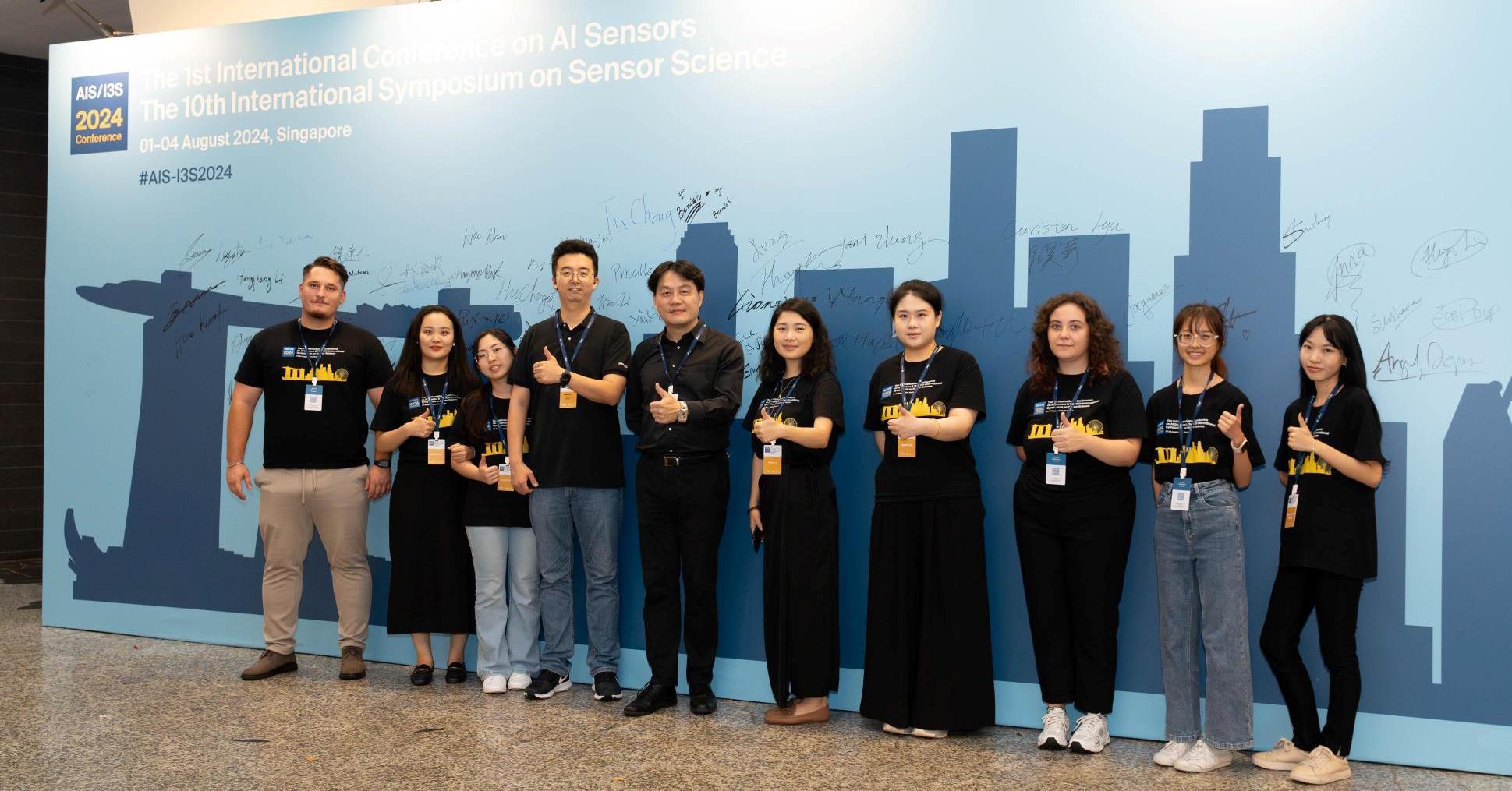
Thank you to our Conference team, including Ionut Spatar, Teodora Nicoleta Cremene, Ang Kai Lin, Benjamin Tay, Leong Jin Yue Esther, Wong Jolin, Judith Wu, Alethea Liu and Flora Li, who were involved in making this event a success. A big thank-you also goes to our local MDPI colleagues for their support: Yu Nwe Soe, Hen Chu Yang, Kwah Zhi En Watcharapong, Zephan Yang, Daphne Neo, Huimin Cheng, Nathan Li and Ting Yin.
Upcoming In-Person Event
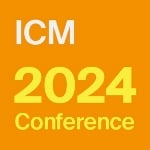
25–27 September, 2024
The 5th International Conference on Materials: Advances in Material Innovation
Location: Basel, Switzerland
ICM 2024 will unite experts to share insights on recent advancements in Materials Characterization, Processing and Manufacturing.
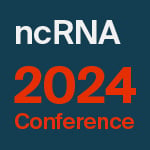
7–9 October, 2024
Non-coding RNA World 2024: Exploring Mechanisms, Designing Medicines
Location: Basel, Switzerland
ncRNA 2024 will explore the latest advances in the field, covering topics from basic biology to medical and technological applications.
Find more upcoming MDPI events here.
Closing Thoughts

The 2nd Sustainable Publishing Forum
In 2022, the International Association of Scientific, Technical and Medical Publishers (STM) outlined three goals to reflect the academic community’s shared aspirations: promoting Open Science, maintaining research integrity and fulfilling social responsibility. Open Science has evolved from the Open Access movement of the early 2000s to become a preferred model in academic publishing. Publishers and academic journals play a crucial role in ensuring research integrity, with efforts to prevent misconduct markedly on the increase now.
As the world faces sustainability challenges, the academic publishing industry is increasingly committed to contributing the achievement of the United Nations Sustainable Development Goals (SDGs). Many publishers are implementing strategies to support these objectives, including ours, which you can view here.
The 2nd MDPI Sustainable Publishing Forum provided a platform for global editors and publishers to discuss these themes, aiming to strengthen collaboration and advance the contributions that scientific publishing can make to academia and society.
“Open Science has evolved to become a preferred model in academic publishing”
The 2nd Sustainable Publishing Forum
We hosted MDPI’s 2nd Sustainable Publishing Forum in Beijing, China, on 15–16 August, attracting nearly 120 attendees from local and international publishers, university presses, scientific and technical journal associations, libraries and the Chinese Academy of Sciences. The event focused on promoting Open Science, maintaining research integrity, and fulfilling social responsibility.
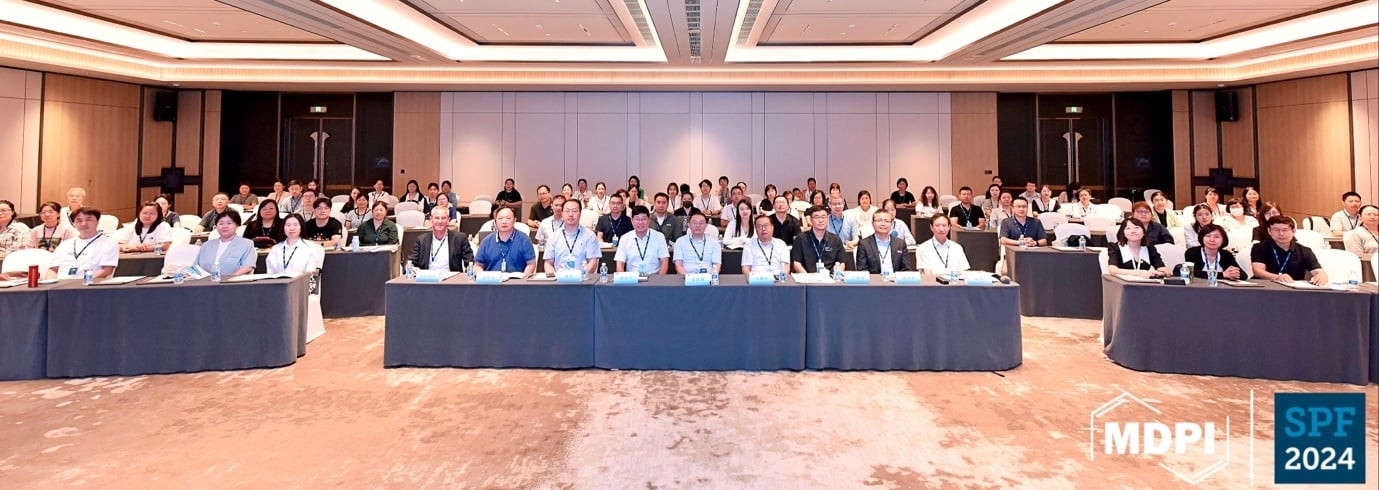
This was an excellent opportunity for us to share more with conference attendees about the approach of our research integrity team. Our Head of Publishing, Peter Roth, also participated, speaking on how to identify and avoid predatory publishers and about the principles that underpin ethical academic publishing.
I extend my thanks to all of our conference speakers, including Hylke Koers (STM Solutions), who presented on STM Trends 2028 and shared insights on the STM Integrity Hub, of which MDPI is a member.
Chief Executive Officer
MDPI AG
26 August 2024
Meet Us at the 18th European Conference on Computer Vision, 29 September–4 October 2024, Milano, Italy

MDPI will be attending the 18th European Conference on Computer Vision (ECCV 2024) in MiCo Milano, Italy, which will take place from 29 September to 4 October 2024. The European Conference on Computer Vision (ECCV) is a premier biennial research conference in Computer Vision and Machine Learning, managed by the European Computer Vision Association (ECVA). It is held on even years and gathers the scientific and industrial communities within these areas. The first ECCV was held in 1990 in Antibes, France, and the conference has subsequently been organized all over Europe.
The following MDPI journals will be represented:
- Applied Sciences;
- Electronics;
- AI;
- Future Internet;
- Inventions;
- Journal of Imaging;
- Machine Learning and Knowledge Extraction;
- Mathematics;
- Remote Sensing;
- Technologies.
If you are attending the conference, please visit our booth. Our delegates look forward to meeting you in person and answering any questions that you may have. For more information about the conference, please visit the following link: https://eccv.ecva.net/.
23 August 2024
Meet Us at the 2024 IEEE Information Theory Workshop, 24–28 November 2024, Shenzhen, China
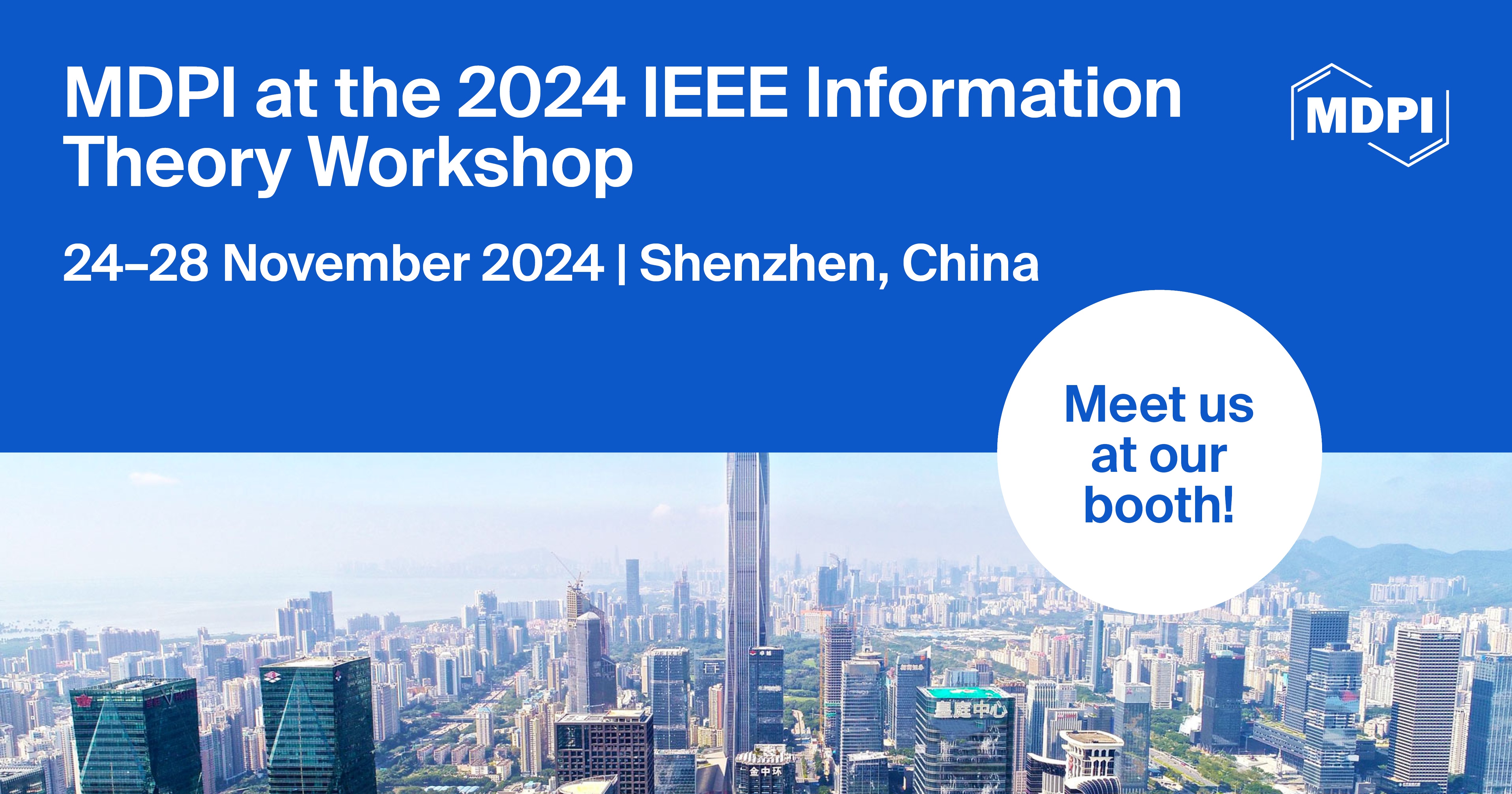
Conference: 2024 IEEE Information Theory Workshop
Organization: Tsinghua Shenzhen International Graduate School and IEEE Information Theory Society
Date: 24–28 November 2024
Place: Shenzhen, China
We are pleased to announce that MDPI will be attending the 2024 IEEE Information Theory Workshop as an exhibitor. This meeting will be held in Shenzhen, China, from 24 to 28 November 2024.
This conference consists of a daily plenary followed by two parallel technical sessions throughout the day. IEEE-ITW’24 welcomes original contributions on the frontiers of information theory, statistics, coding theory, and their applications, as well as interactions between information theory and other fields such as data science, biology, and signal processing.
The following MDPI journals will be represented:
- Entropy;
- Information;
- Data;
- Future Internet;
- Cryptography;
- Network;
- Digital;
- JCP;
- Mathematics;
- Electronics.
If you are attending this conference, please feel free to engage with us while you are there. Our delegates look forward to meeting you in person and answering any questions you may have. For more information about the event, please visit the following website: https://www.ieee-itw2024.org/.
21 August 2024
Mathematics Webinar | The Utilization of Stochastic Reconstruction in Estimating, Diagnosing and Extending the Hawkes Process Model, 12 September 2024

MDPI would like to invite all experts recognized in their fields to attend a webinar organized by our journal Mathematics (ISSN: 2227-7390) entitled—The Utilization of Stochastic Reconstruction in Estimating, Diagnosing and Extending Hawkes Process Models. The aim of the webinar is to focus on the Hawkes process model, a point process model widely used in both natural and social sciences. Its ability to examine clustering effects and positive interactions among events makes it a powerful tool for many researchers. During this talk, the ways in which stochastic reconstruction can be applied to estimate, diagnose, and enhance the Hawkes process model will be explored. This webinar will be valuable and inspiring for anyone working with these models.
We are looking forward to seeing you at the webinar.
Webinar: The Utilization of Stochastic Reconstruction in Estimating, Diagnosing and Extending Hawkes Process Models
Date: 12 September 2024
Time: 9:00–9:50 (CEST) | 16:00–16:50 (JST)
More information: https://sciforum.net/event/Mathematics-8
This is a free webinar. After registration, you will receive a confirmation email containing information on how to join. Registrations with academic institutional email addresses will be prioritized.
Unable to attend? Register anyway and we will let you know when the recording is available for viewing.
Register for free:
Program:
|
Speaker/Presentation |
Time in CEST |
JST |
|
Prof. Dr. Jiancang Zhuang |
9:00–9:05 |
16:00–16:05 |
|
Prof. Dr. Jiancang Zhuang |
9:05–9:35 |
16:05–16:35 |
|
Q&A Session |
9:35–9:45 |
16:35–16:45 |
|
Prof. Dr. Jiancang Zhuang |
9:45–9:50 |
16:45–16:50 |
Relevant Special Issue:
“Stochastic Processes and Its Applications”
Edited by Dr. Elvira Di Nardo and Prof. Dr. Luis Alberiko Gil-Alana
Submission Deadline: 31 May 2025
19 August 2024
Interview with Prof. Dr. Masahiro Yamamoto—Winner of the Mathematics 2022 Best Paper Award
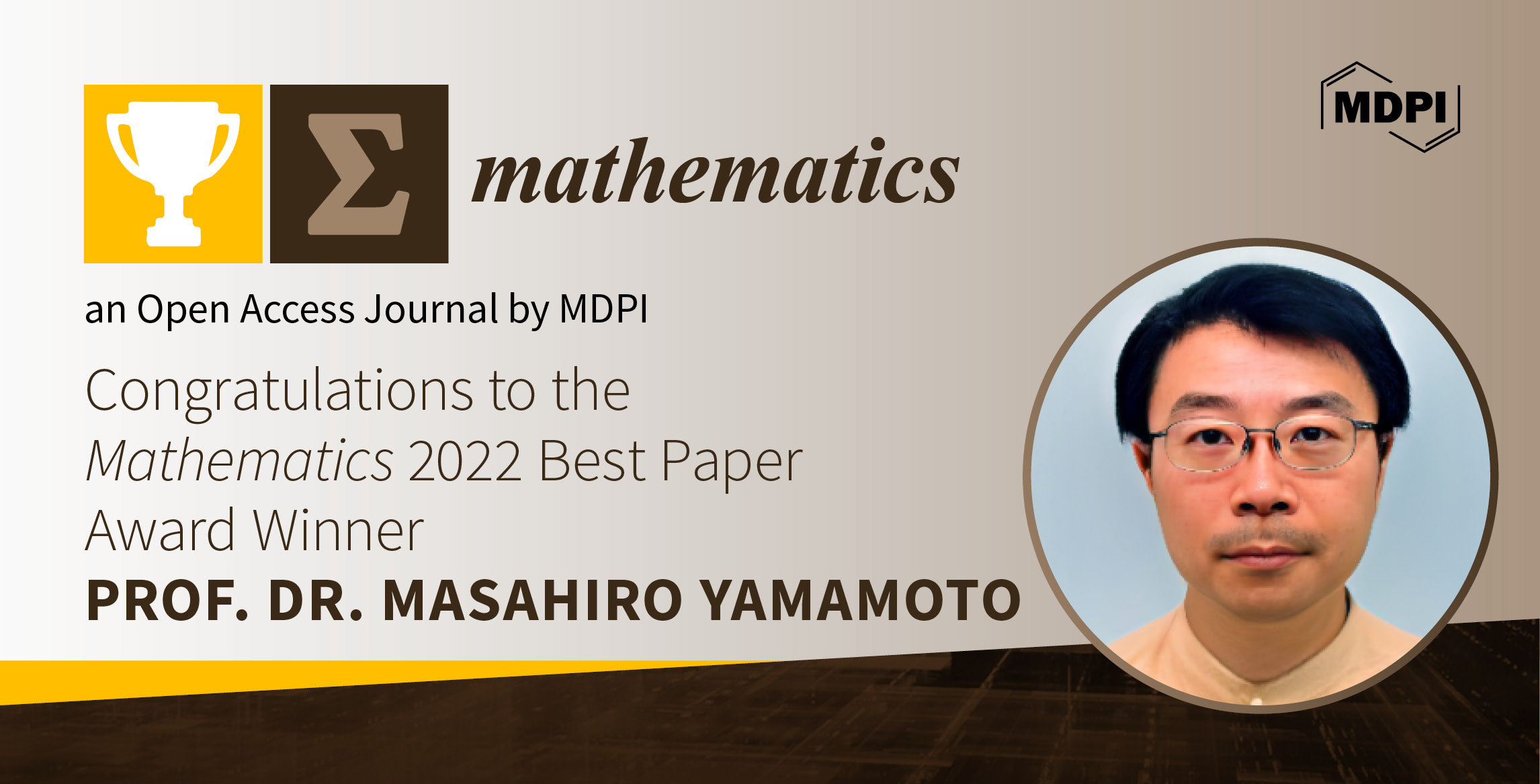
We wish to congratulate Prof. Dr. Masahiro Yamamoto for winning the Mathematics 2022 Best Paper Award.
Name: Masahiro Yamamoto
Affiliation: Graduate School of Mathematical Sciences, The University of Tokyo, Komaba, Meguro, Tokyo 153-8914, Japan
Interests: inverse problems in mathematical sciences; parameters in evolution equations; determination of shapes of domains from overdetermining data
Masahiro Yamamoto has been a full professor in the Graduate School of Mathematical Sciences of The University of Tokyo, Japan, since 2010, and he is now a Project Professor and Emeritus Professor at the University of Tokyo and a professor at Zonguldak Bulent Ecevit University in Turkey. In 1983, he obtained the degree of Master of Science from the University of Tokyo. He received a Ph.D. from the University of Tokyo for a thesis entitled “Inverse Spectral Problem for Systems of Ordinary Differential Equations” in 1988. His research interests include inverse problems by Carleman estimate; inverse boundary value problems; determination of shapes; fractional partial differential equations and optimal control.
The following is from an interview with Prof. Dr. Masahiro Yamamoto:
1. Could you give a brief introduction of yourself to the readers? Could you introduce your current research direction and provide an update on your progress?
I have been working on control theory, inverse problems for partial differential equations and time fractional partial differential equations. In particular, I have started mathematical research for fractional differential equations, motivated by the analysis of the anomalous diffusion of radioactive nuclide, which was seriously emitted by the Fukushima nuclear disaster in 2011. In order to maintain reasonable shapes of my own theoretical research, I, a mathematician, am confident that it is so important to maintain contact with more applied aspects. Moreover, through such contact, one can find significant topics from the real-world which are awaiting mathematical studies. In other words, in this field, mathematicians must always pursue not only theories but also possible practice of the developed theories.
Holding such views, I have recently been working on the uniqueness and stability of various inverse problems for time-fractional differential equations, as well as for transport, parabolic, hyperbolic, Schrodinger equations.
2. Could you please briefly introduce the main content of the winning paper?
There have been many important works on time-fractional differential equations such as the unique existence of solutions to initial value problems and initial boundary value problems. However, aiming at more consistent convenient applications to inverse problems, I proposed a framework based on the operator theory. This approach is not purely new, but I have integrated existing results and expertise such as the operator theory and the theory of evolution equations, and I have demonstrated the effectiveness of the framework in various problems for time-fractional differential equations.
In the winning paper, I have tried to establish foundations of the theory of time-fractional differential equations, which is directly applicable to inverse problems.
3. Could you describe the difficulties and breakthrough innovations in this research field?
Fractional calculus is similar to classical calculus treating derivatives of natural number orders, but not the same. For example, formulae of integration by parts for fractional derivatives do not allow us to use energy estimates and Carleman estimates, which are strong tools for inverse problems. Such a difference is a main difficulty. Thus, it is definitely a breakthrough that we can completely clarify which properties can still hold and which are essentially different among the properties of parabolic equations and hyperbolic equations. Through such complete clarification, we can also understand the essence of anomalous diffusion.
4. What appealed to you about the journal that made you want to submit your paper? How was your experience submitting to Mathematics?
The wide range of audience is appealing, and the referee procedure was excellent.
5. Which research topics do you think will be of particular interest to the research community in the coming years?
- The inverse problems for fractional partial differential equations;
- The establishment of the theory of time-fractional differential equations which may generalize the classical theory of partial differential equations.
6. Do you have any advice for aspiring young researchers looking to make a meaningful impact in their respective fields?
- Do not aim too much at currently popular research fields. Also, we should keep in mind that we try to find rough gemstones which will open up rich and important research fields;
- It may take a long time until your achievements are well recognized and evaluated; please be patient and continue to work;
- In order to maintain your mathematical research, please grasp wide scopes not only involving mathematics but also real-world problems. Remember that mathematics looks transcendental and far away from reality, but it can solve real world problems and potentially even save the world.
7. As the winner of this award, is there something you want to express or someone you wish to thank most?
The late Professor Dr. Rudolf Gorenflo. He introduced me to the world of fractional calculus and has supported my research. It is a pity that now I cannot directly convey my gratitude to him, and I am surely indebted to him.
8. What is your opinion of the open access model of publishing?
Open access is fine, especially for mathematics if used relevantly, because mathematical achievements are fundamental and so are more similar to common properties, especially among natural sciences.
19 August 2024
MDPI’s 2023 Young Investigator Awards—Winners Announced
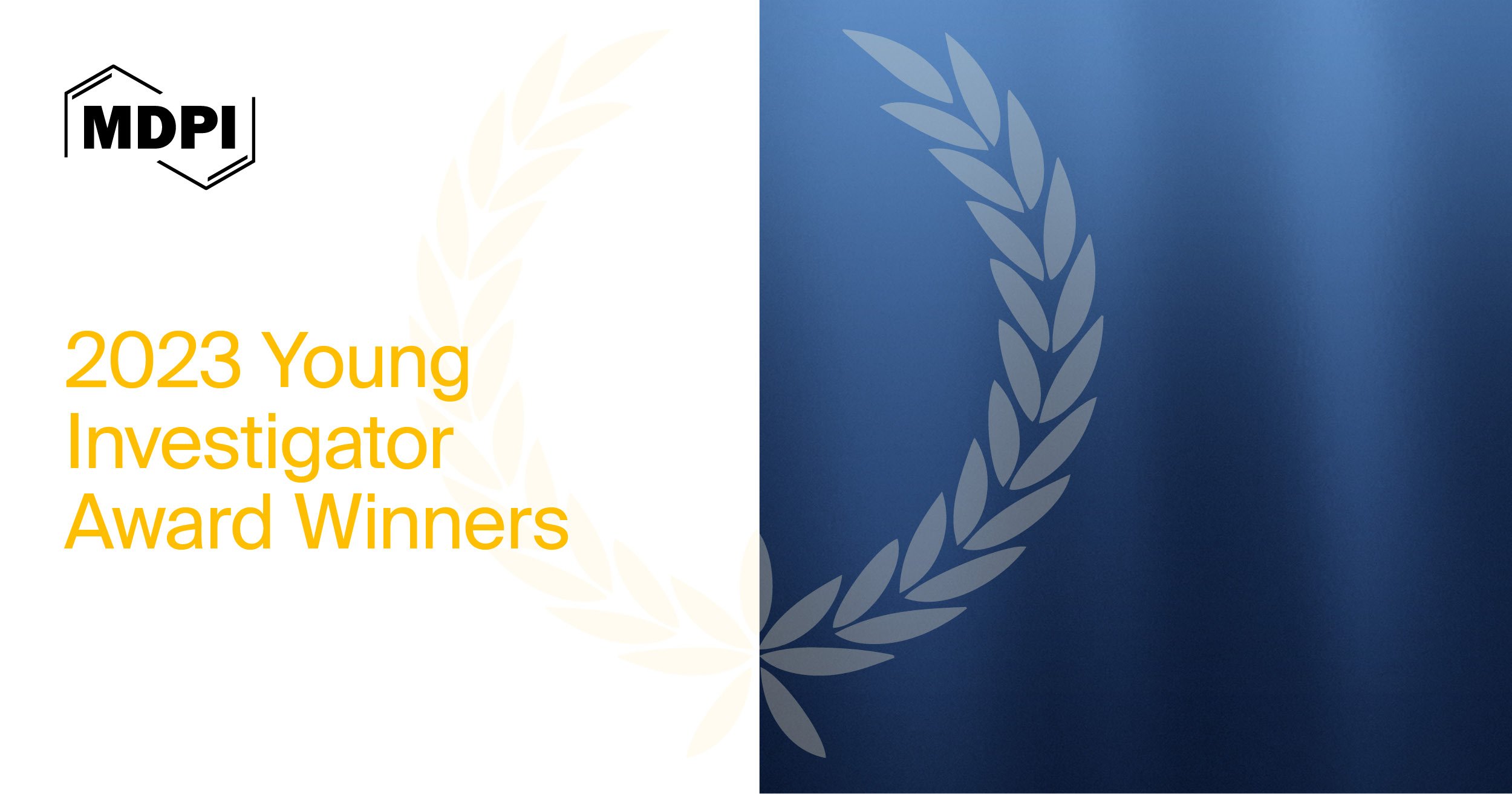
MDPI’s Young Investigator Awards recognize promising early career scientists, acknowledge their contributions, and foster collaboration within the scientific community. We are proud to announce the recipients for 2023, who were carefully selected by the journals’ esteemed Award Evaluation Committee.
We extend our heartfelt congratulations to the 79 winners of MDPI’s 2023 Young Investigator Awards for their excellent contributions in their research field. We look forward to seeing these rising stars continue to contribute to the advancement of science.
MDPI will continue to support and recognize the academic community. To explore details about the awardees by field, please visit the individual pages listed below:
Congratulations to all the winners for their exceptional contributions and dedication to advancing scientific research.
About MDPI Awards:
To support the academic community, particularly young researchers, and to enhance communication among scientists, MDPI journals regularly offer various awards to researchers in specific fields. These awards, serving as a source of inspiration and recognition, help to elevate the profiles of talented individuals who have made outstanding achievements and are making significant contributions to advancements in their respective fields.
To find out more about MDPI awards, please click here.
13 August 2024
Meet Us at the Physical Society of Japan 2024 Annual Meeting, 16–19 September 2024, Hokkaido, Japan
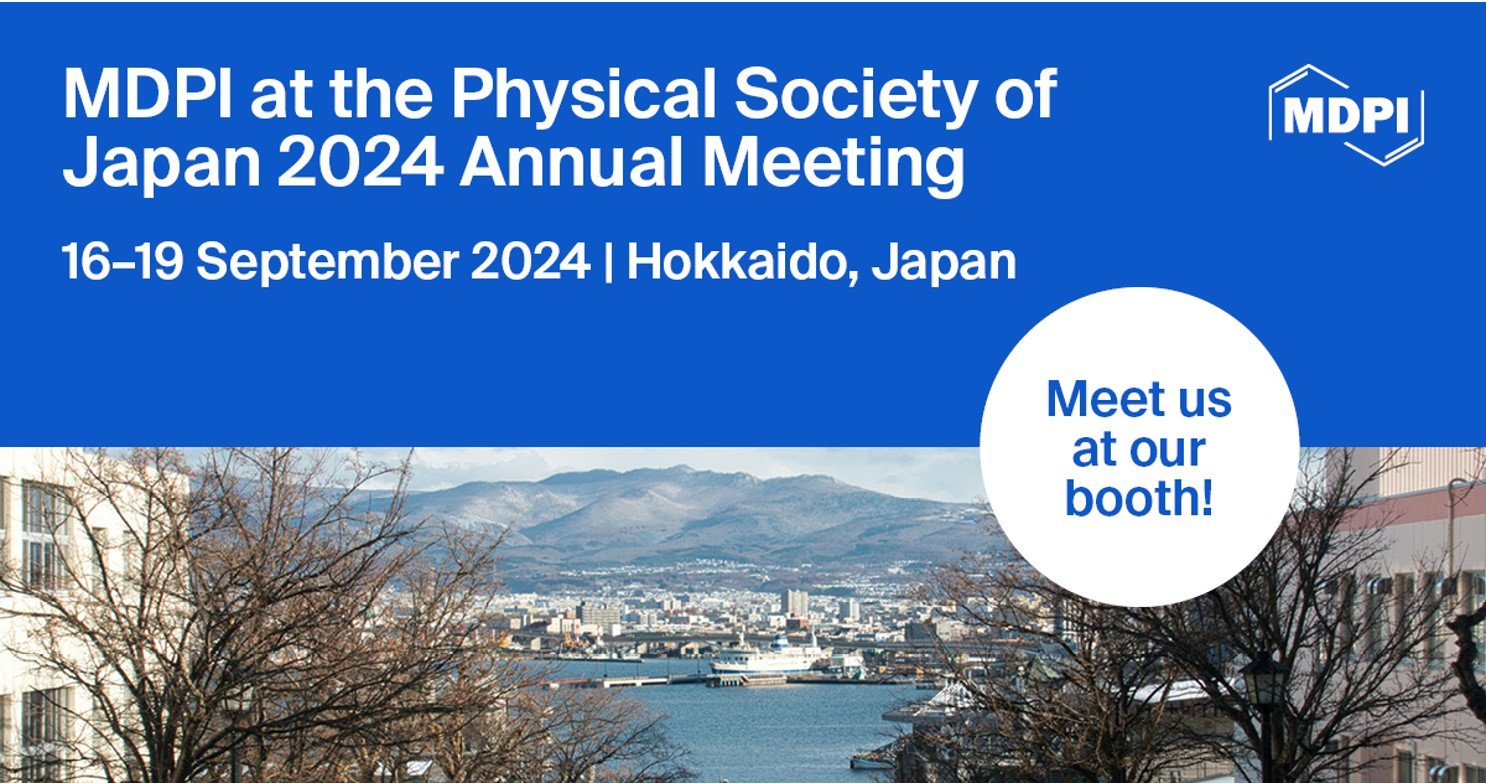
MDPI will be attending the Physical Society of Japan 2024 annual meeting, which will be held from 16 to 19 September 2024 in Hokkaido, Japan.
The Physical Society of Japan (JPS) holds nationwide scientific meetings in the spring and autumn of each year and categorizes all the fields of physics into 19 divisions. During the annual meeting, recent research from all these divisions is discussed at one venue. The autumn meetings are held at different venues, covering the 13 divisions of condensed matter physics and other fields. As many as 5,000 researchers take part in both the spring and autumn meetings, where more than 3,000 presentations and active discussions take place.
The following topics will be covered:
- Theoretical Particle Physics;
- Experimental Particle Physics;
- Theoretical Nuclear Physics;
- Experimental Nuclear Physics;
- Cosmic Rays/Astrophysics;
- Beam Physics.
Division 1: Atomic and Molecular Physics, Quantum Electronics, Radiation;
Division 2: Plasma;
Division 3: Magnetism;
Division 4: Semiconductors, Mesoscopic Systems and Quantum Transport;
Division 5: Optical Properties of Condensed Matter;
Division 6: Metal Physics [Liquid Metals, Quasicrystals], Low Temperature Physics [Ultralow Temperatures, Superconductivity, Density Waves;
Division 7: Molecular Solids;
Division 8: Strongly Correlated Electron Systems;
Division 9: Surfaces & Interfaces, Crystal Growth;
Division 10: Structural Property(Dielectrics, Ferroelectricity, Lattice Defects and Nanostructures, Phononic Properties, and X-ray and Particle Beams);
Division 11: Fundamental Theory of Condensed Matter Physics, Statistical Mechanics, Fluid Dynamics, Applied Mathematics, Socio- and Econophysics;
Division 12: Soft Matter Physics, Chemical Physics, Biophysics;
Division 13: Physics Education, History of Physics, Environmental Physics.
The following MDPI journals will be represented at the symposium:
- Applied Science;
- Galaxies;
- Plasma;
- Atoms;
- Optics;
- Surfaces;
- Instruments;
- Technologies;
- Fluids;
- Magnetochemistry;
- Physics;
- Mathematics;
- Condensed Matter.
If you are planning to attend the above conference, we encourage you to visit our booth and speak to our representatives. We are eager to meet you in person and assist you with any queries that you may have.
For more information about the conference, please visit the official website at https://gakkai-web.net/jps/jps_e_program/2024au/index.html.
8 August 2024
Interview with Dr. Minhyeok Lee—Winner of the Mathematics 2023 Outstanding Reviewer Award
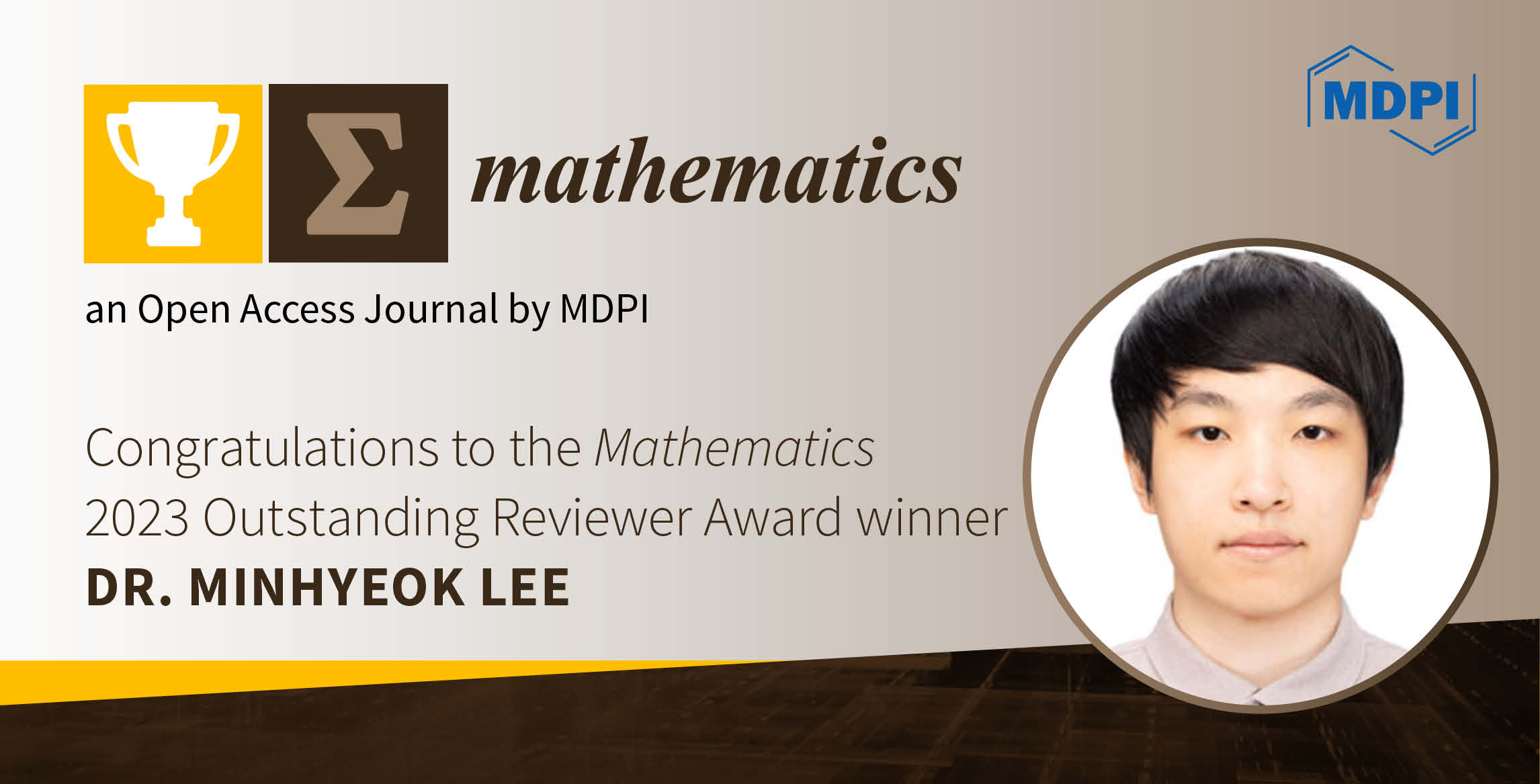
We wish to congratulate Dr. Minhyeok Lee for winning the Mathematics 2023 Outstanding Reviewer Award.
Name: Dr. Minhyeok Lee
Affiliation: School of Electrical and Electronics Engineering, Chung-Ang University, Seoul 06974, Republic of Korea
Research Interests: deep learning; machine learning; generative adversarial network
The following is from an interview with Dr. Minhyeok Lee:
1. Could you give a brief introduction of yourself to the readers? Could you introduce your current research direction and provide an update on your progress?
My research focuses on the mathematical foundations of generative models and computational intelligence. I am currently investigating the convergence properties of multi-task deep learning games using techniques from game theory and convex optimization. My work aims to establish rigorous theoretical guarantees for the performance and stability of complex neural network architectures.
2. Can you please share with us your sentiments upon winning the award?
The award recognition aligns with my commitment to advancing mathematical rigor in the field of computational intelligence. It reflects the importance of applying formal mathematical analysis to emerging computational techniques. This acknowledgment may help promote the increased emphasis on theoretical foundations within the broader research community.
3. Could you share some insights into your approach to reviewing manuscripts? How do you balance thoroughness with efficiency?
My review approach centers on assessing the mathematical validity and novelty of the presented work. I examine proofs, derivations, and algorithmic complexities to ensure logical consistency and correctness. Efficiency is maintained by focusing primarily on the core mathematical contributions rather than peripheral details.
4. In your opinion, what are some key qualities that make a review outstanding?
Key qualities of an outstanding review include identifying logical gaps in mathematical arguments, suggesting relevant theoretical connections or generalizations, assessing the mathematical significance and originality of the results, providing constructive feedback to strengthen formal proofs, and maintaining objectivity in evaluating the work’s mathematical merit.
5. Based on your experience, which research topics do you think are of particular interest to the research community in the coming years?
Promising research directions include the theoretical analysis of large language models, mathematical frameworks for explainable AI, information-theoretic approaches to deep learning, and advances in geometric deep learning. These areas offer rich opportunities for developing new mathematical tools and insights.
6. What is your opinion of the open access model of publishing?
The open access model aligns with the universality of mathematical truth and the field’s collaborative nature. It promotes the wider dissemination of mathematical knowledge, potentially accelerating theoretical advancements. However, maintaining rigorous peer review processes remains crucial for upholding the integrity and quality of published mathematical work.
7 August 2024
MDPI Insights: The CEO's Letter #14 - New Headquarters, Marketing, Poland

Welcome to the MDPI Insights: The CEO's Letter.
In these monthly letters, I will showcase two key aspects of our work at MDPI: our commitment to empowering researchers and our determination to facilitating open scientific exchange.
Opening Thoughts
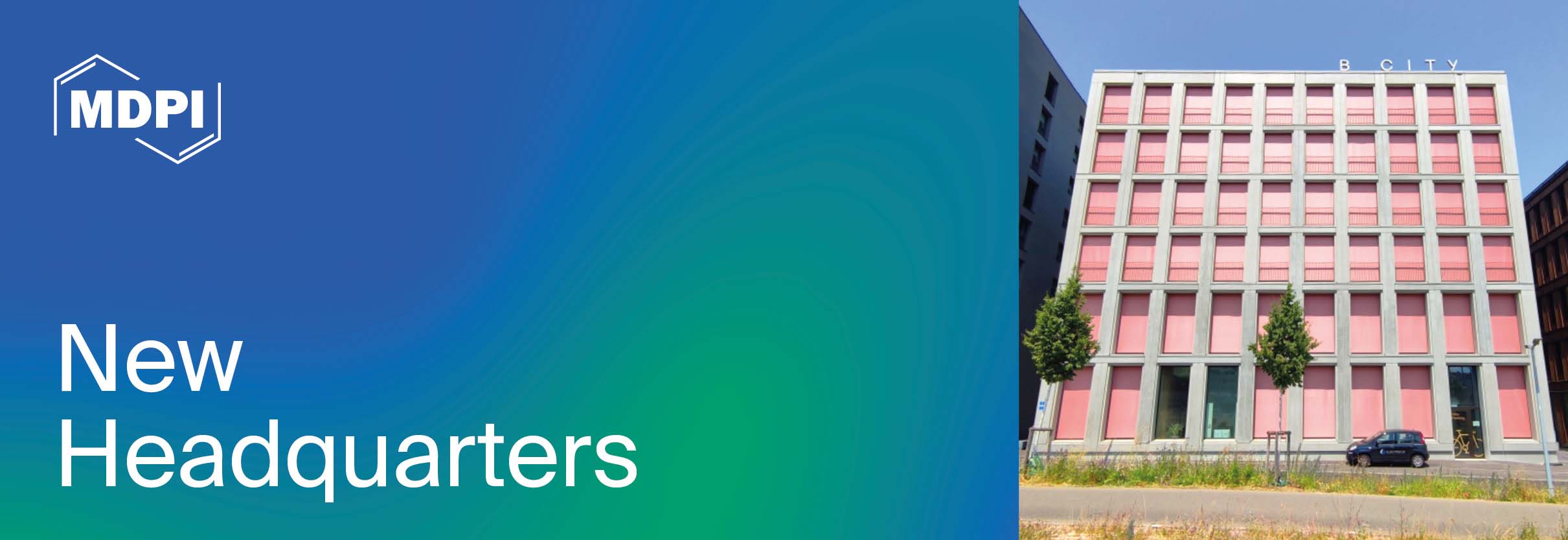
MDPI Moves to New Headquarters in Basel, Switzerland

I am excited to share that MDPI has moved to a new state-of-the-art office space in Basel, Switzerland. This move consolidates our operations by bringing together our two previously separated Basel offices into one central location.
We are always growing our talent pool and encourage you to view our Careers Page for the positions available in Basel and across our offices.
New Address: Grosspeteranlage 5, CH-4052 Basel, Switzerland
Effective Date: 1 July 2024
This new chapter in our company’s journey is designed to continue our mission of positioning MDPI as a leader in Open Access (OA) publishing, highlighting our commitment to making scholarly research accessible to everyone.

Boasting modern amenities, improved meeting and event spaces designed to support our growing needs, the new location provides a more collaborative and efficient working environment for our employees. The location offers convenient accessibility to public transportation and is situated near the Basel SBB railway station, with a variety of nearby services and amenities.
In fact, I can see the trains right outside of my window as I write these lines!
This move marks an exciting milestone in MDPI’s development, and I am confident that the new headquarters will serve as an inspiring and productive space for everyone. We also very much look forward to welcoming visitors here. You can read more about MDPI's history here.
“This new chapter continues our mission of positioning MDPI as a leader in OA publishing”
For Those New to MDPI
A pioneer in scholarly, Open Access publishing, MDPI has supported academic communities since 1996. MDPI is leading the transition to Open Science by making a greater proportion of the research conducted worldwide free and accessible to everyone. To date, over 3.5 million researchers have entrusted MDPI with publishing their scientific discoveries. MDPI’s editorial process is bolstered by a network of dedicated reviewers, a team of 6,000 professional, well-trained staff members, and an in-house article submission platform designed to ensure efficient processes within its 440 fully Open Access titles. MDPI supports more than 800 academic institutions worldwide, helping them adhere to national mandates while facilitating authors’ publication in fully compliant (CC BY) Open Access journals.
Impactful Research
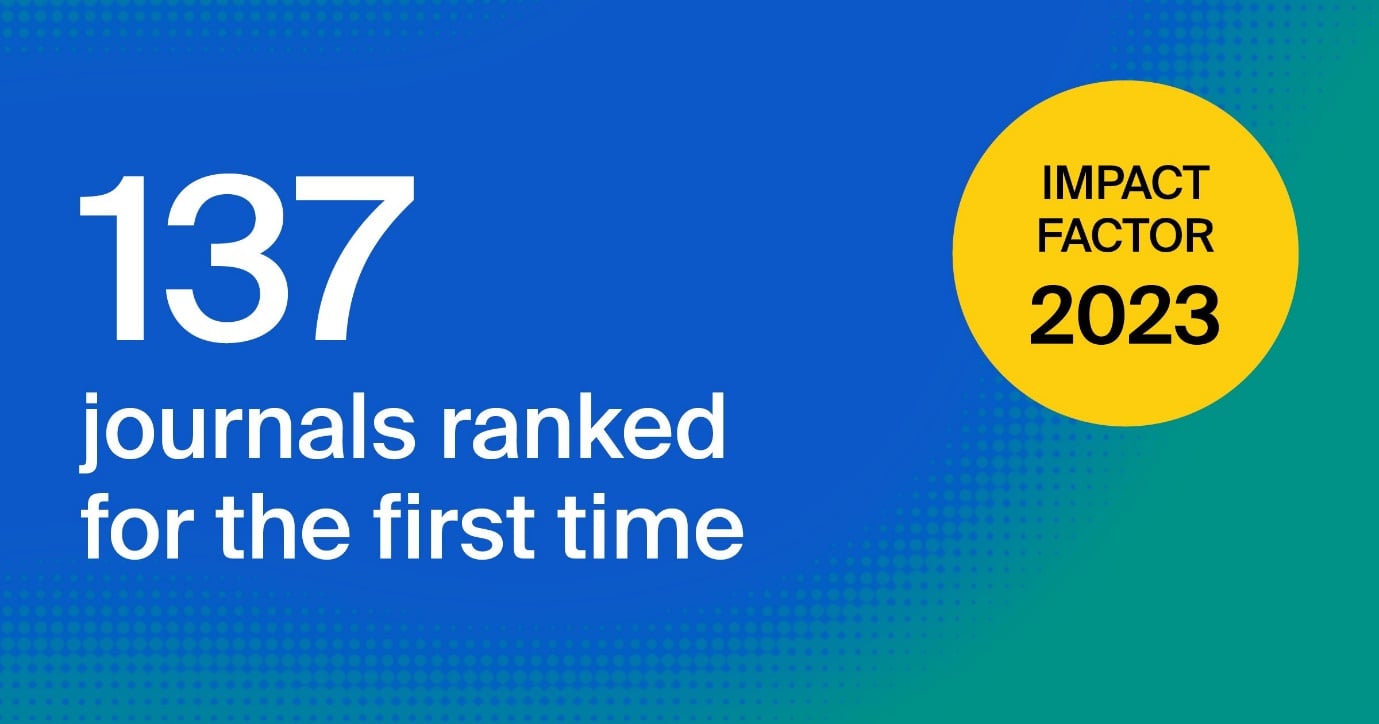
New and Emerging MDPI Journals Making an Immediate Impact
Unpacking some of the Impact Factor updates from the June CEO Letter, I wanted to dive a little deeper into the 137 MDPI journals which received Impact Factor for the first time.
Academic authors highly value efficient publishing processes, robust editorial support, and the opportunity to publish in high-impact journals. We are proud that our newly launched journals typically achieve coverage in the Emerging Sources Citation Index (ESCI) of the Web of Science within just a few years, with a median time of only three years from release to inclusion.
As part of our commitment to advancing academic research and providing high-quality OA publishing, we actively seek new research areas to expand our portfolio of journals. We have a proven track record of successfully establishing new journals.
Our dedicated teams excel in fostering dynamic editorial boards and working closely with Editors-in-Chief (EiC) to define the precise scope and focus of each new journal. Our expertise extends to collaborating with indexing services, ensuring that our journals comply with best practices and are indexed promptly in all relevant databases.
Emerging Titles Ranked for the First Time
Our commitment to excellence is reflected in the annual impact metrics released this past June. The latest edition of the Journal Citation Reports (JCR) showcases the integration of journals from the ESCI in the new unified category rankings, providing a simplified and more complete view of all journals within each subject category, including newly established titles.
Out of 137 new and developing MDPI journals ranked in the 2024 release, 79 are in the top half (Q1 or Q2) of their categories. Here is a breakdown of the number of MDPI’s ESCI-indexed journals by quartile in the JCR:
| Quartile | No. of journals |
| Q1 | 17 (12.4%) |
| Q2 | 62 (45.3%) |
| Q3 | 43 (31.4%) |
| Q4 | 15 (10.9%) |
| Not ranked (humanities-related journals) | 2 |
These rankings highlight our success in rapidly establishing high-impact new journals. Among those that made it directly into the top 25% of their category are the International Journal of Neonatal Screening, Journal of Xenobiotics, Polysaccharides, Smart Cities, and thirteen other journals.
You can browse MDPI journals by Indexing. Simply visit our Journals page and select from the list of Indexing bodies in the top left-hand corner.
Inside MDPI

MDPI Corporate Marketing Strategy and Team Meeting 2024
In July, I hosted the annual Corporate Marketing strategy and team-building activity with 15 of our team members.
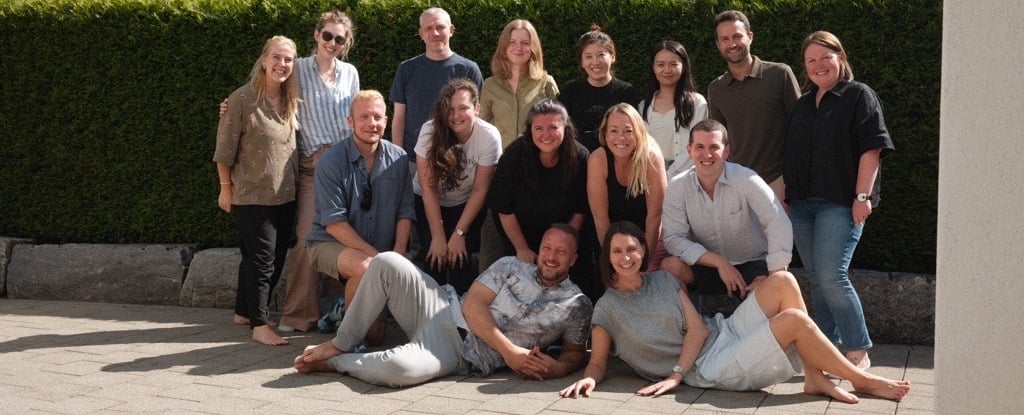
The aim was to align the Corporate Marketing strategy with MDPI's goal of becoming the world's most trusted OA publisher. While we provide a high-level publishing experience for our authors, as seen from our surveys, we need to keep building on our transparent and open communication to foster trust within the scholarly community and continue enhancing our reputation.
The Corporate Marketing team plays an important role as the mouthpiece for all our major activities within MDPI, especially those that model what it means to be a trusted partner. The purpose of the strategy meeting was to develop a feeling of trust in one another and an understanding of how to inspire trust in the stakeholders with whom we interact.
“We need to keep building on our transparent and open communication to foster trust within the scholarly community”

We conducted a set of activities to facilitate that sense of mutual trust and trustworthiness. Examples of some activities we worked on during this strategy-building event include:
- Exploring what trust means
- ‘Letter to self’
- ‘The brand I most trust’
- Most Trusted Academic Publisher
- ‘The brand I would like MDPI to become’
- ‘The 2029 MDPI Annual Report’
- Voice of Customer and Share of Voice – survey/data update on MDPI Brand Experience and Brand Perception
- Integrate Trust-Based Objective into Marketing Plan
- ‘Becoming the MDPI experience’
- ‘Trusting the next steps’
While two days is not enough to finalize a marketing strategy, it is sufficient to get everyone who attended into the mindset of the direction in which we are working. From here, we will develop a program with next steps on main projects, update communications, and collaborate with team leads to incorporate this approach into our work going forward.
As a marketing team, we can communicate our messages, but trust has to be built at every touchpoint in the stakeholder journey. Just talking about it isn’t enough. We need to be about it. That’s a role each of us plays, from editorial to IT, from marketing to HR. We must build trust from the inside out. It starts with each manager and resonates out via every team member.
As a company, our goal is to give all stakeholders with whom we interact – whether internal or external – the experience of working with an organization it can trust.
Coming Together for Science
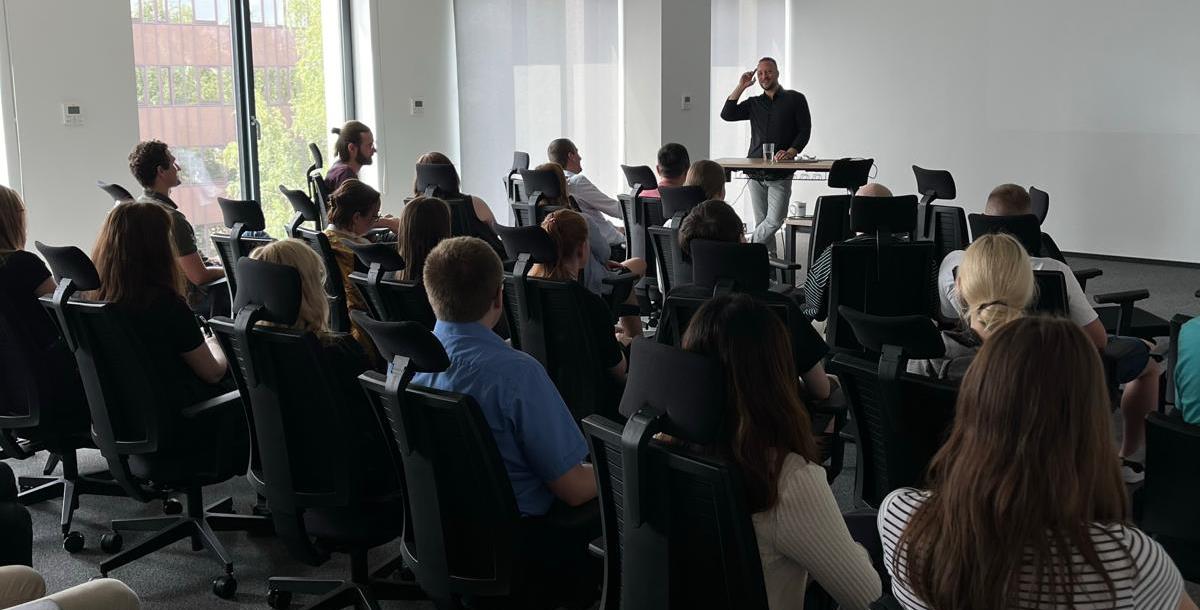
MDPI in Poland: Krakow Office
In July, I had the pleasure of visiting our Krakow office, following my recent trip to Warsaw to meet with the Polish Ministry of Science and Higher Education.

During these visits, I prioritized meeting with our Office Manager, Editorial Director, Group Leads, and members from various teams, including editorial, production, marketing, and journal relationship specialists, to understand their roles and current challenges. Instead of a formal presentation, I opted for an open discussion, sharing updates from headquarters to engage with colleagues in a more personal way.
Our Krakow office has many things to be proud of, including a large number of PhD colleagues (over a third of its staff holds a PhD degree). Krakow provides an opportunity for expanding beyond the 100 colleagues we currently have, by adding new hires in departments including editorial, production and marketing, among others.
About our Krakow office
- Opened in 2020
- 99 staff members as at 1 August 2024
- Main Departments include Editorial, Production, English Department, JRS, PR
Our Krakow office participates in international conferences, conducts author trainings and scholar visits, and engages in local market outreach. The office is also a member of the Polish Chamber of Commerce for High Technology (IZTECH) and is working on expanding its local engagement.
Krakow is the second-largest city in Poland, with a population of about 800,000. It also has a large student population of around 128,000, with seven universities. This means that roughly one in every eight residents is a student.
Poland and MDPI
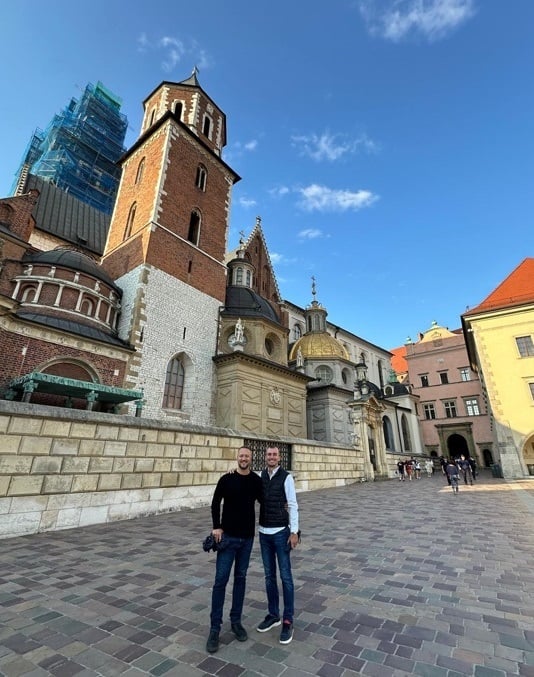
Poland is a crucial market for MDPI. From 2020 to June 2024, Poland ranked 7th in submissions and 5th in publications for MDPI research articles. As at 31 July 2024, Poland ranks 7th in total MDPI publications, with approximately 70,000 research papers.
Between 2020 and June 2024, 61,500 authors from Poland published with MDPI. As at 30 June 2024, there are 1,205 active Editorial Board Members (EBMs) from Poland, with 661 EBMs (55% of the total) having an H-index over 25.
We also have four Editors-in-Chief (EiC) from Poland leading our journals: Coatings, Venereology, Advances in Respiratory Medicine, and Limnological Review, along with six Section EiC.
In 2023, we received approximately 21,000 submissions from Polish-affiliated authors, of which 12,032 were published.
“Poland is a crucial market for MDPI”
Meeting with Ministry of Education
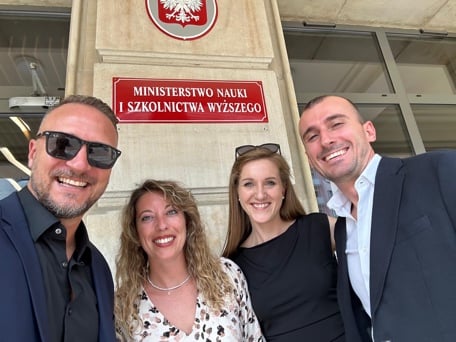
On 22 July, we visited Warsaw to meet with the Polish Ministry of Science and Higher Education.
We were pleased to learn that they are strong supporters of the OA publishing model and value MDPI’s approach to the peer-review process, including our high ethical standards for quality control.
In 2023 Polish authors predominantly published their papers in OA, with MDPI holding the largest market share in OA publications within the country.
Our commitment to collaborating with Polish institutions is evident through our 33 Institutional Open Access Program (IOAP) agreements with prestigious institutions such as the University of Warsaw, the University of Wroclaw, the Jagiellonian University, and Gdańsk University of Technology. Through IOAP discounts, a healthy waiver rate, and our peer-review voucher system, we provide the Polish scholarly community with significant savings in OA publishing. The Minister greatly appreciated these efforts and our commitment to offsetting some of the APC costs.
We discussed industry concerns about the threat of papermills and presented the preventive measures MDPI has in place to mitigate this risk and uphold high ethical standards. We informed them of our commitment to combating papermills, including our involvement with United2Act and the STM Research Integrity Hub, as well as our efforts to expand our research integrity team and explore proactive measures.
Closing Thoughts

MDPI Thought Leadership Op-ed on Open Access is Now Live on Politico
I am pleased to share that our thought leadership Op-ed piece on Open Access (OA) is now live on Politico. This is a nice push for continued influence and support of OA among policymakers and industry leaders.
Why Politico?
Politico's reputation as a highly credible and influential news platform makes it an important venue to reach key opinion leaders (KOL) from academia, policymakers, and thought leaders from many industries. This visibility helps promote the OA philosophy.
Open Access: A Moral Imperative for Progress
In this piece, I discuss the necessity of making scientific research freely available to all. I argue that publicly funded research should be publicly accessible, highlighting how OA democratizes scientific knowledge, accelerates research availability, and fosters collaboration.
“Open Access is a fundamental right for all citizens”
Democratizing scientific communication
The impulse to democratize scientific communication is nothing new. OA may seem like a recent innovation, but its principles have historical roots traceable to Europe in the 15th century. Just as the printing revolution accelerated the dissemination of new ideas, OA publishing unlocks new scientific insights that would otherwise only be accessible to a few.
Benefits for scholars: amplifying impact through Open Access
Authors publishing in an OA journal can expect more citations of their work, increasing its potential impact. Research findings that are freely available are more likely to be cited than those hidden behind a paywall. Freedom of access greatly increases the potential audience for each paper, fostering a sense of community among researchers worldwide. Heightened visibility can attract prospective collaborators and employers for young scientists. At MDPI, we believe that all these factors can only accelerate the advance of science. Additionally, authors retain copyright in their work instead of signing it away, permitting broader dissemination under Creative Commons licenses and increasing its capacity for impact.
The moral imperative
OA is not just a matter of scientific policy; it is a fundamental right for all citizens and a prerequisite for a brighter, more informed future. Publicly funded research should be a top priority, and I am pleased to see policy moving in this direction. Our capacity to generate transformative scientific insights has to be democratized. The question today is no longer whether we can afford to embrace OA; rather, it is whether we can afford not to.
Chief Executive Officer
MDPI AG
5 August 2024
Mathematics 2024 Young Investigator Award—Open for Applications
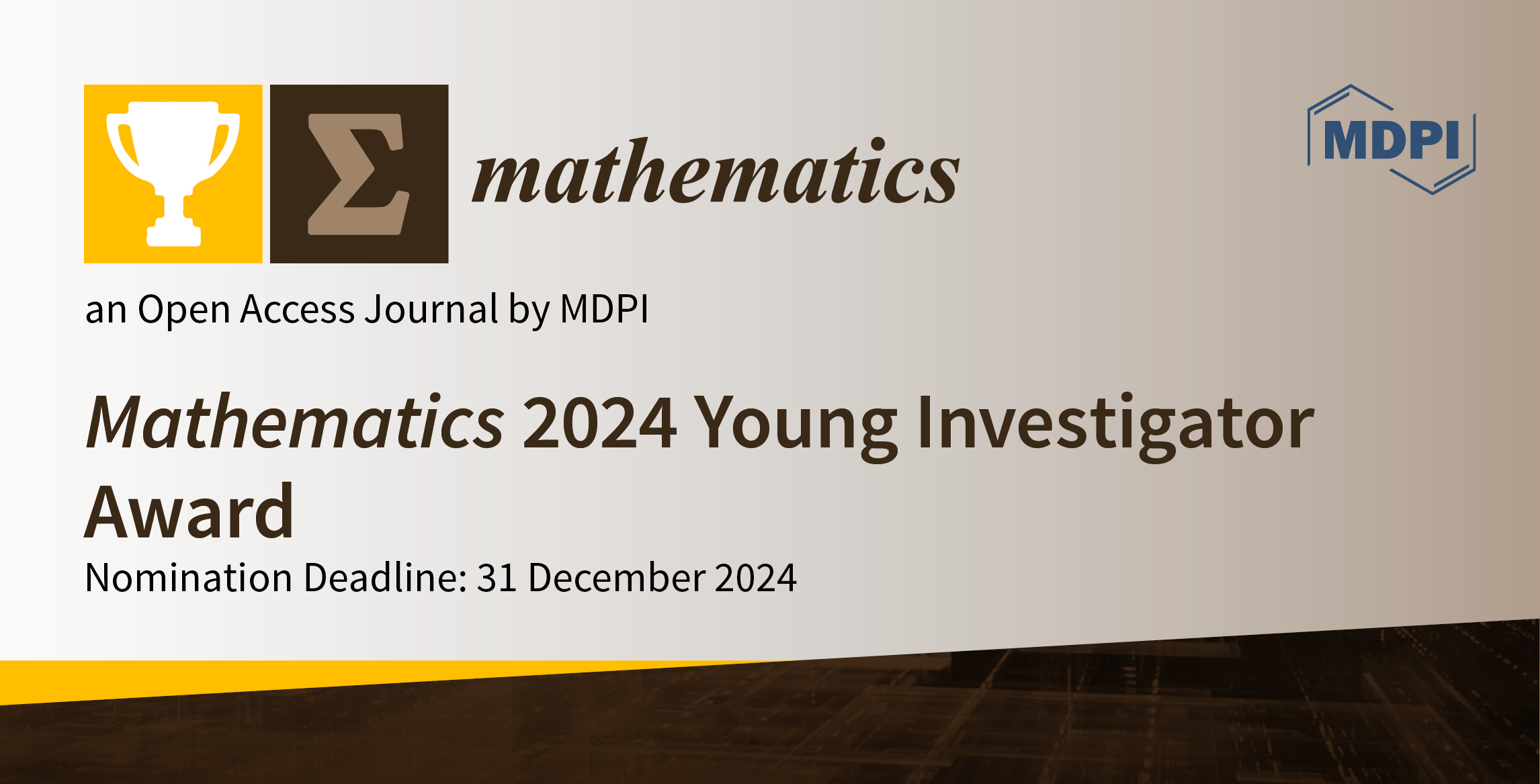
We are pleased to announce that Mathematics (ISSN: 2227-7390) is now inviting nominations for the Mathematics 2024 Young Investigator Award. This prize will be given to one young investigator in recognition of their excellence in the field of mathematical sciences. All the nominations will be assessed by an Award Evaluation Committee led by the Editor-in-Chief, Prof. Dr. Francisco Chiclana.
The Prizes:
- CHF 2000;
- The option to publish one paper free of charge in Mathematics after peer review before the end of December 2025;
- An electronic certificate.
Eligibility and Requirements:
- The candidate must have received their Ph.D. no more than 10 years prior to 31 December 2024;
- The candidate must have produced ground-breaking research and made a significant contribution to the advancement of mathematical sciences;
- The candidate must be nominated by senior scientists.
List of Documents for Nomination:
- Detailed CV, including an updated publication list and a list of the researcher’s own research grants;
- Scanned copy of their doctorate certificate;
- Signed nomination letters from two established senior scientists.
Schedule:
Nomination deadline: 31 December 2024;
Winner announcement: 31 March 2025.
How to Submit Nominations?
The nominations must be submitted online.
Contact:
Email: mathematics@mdpi.com
Mathematics Editorial Office




